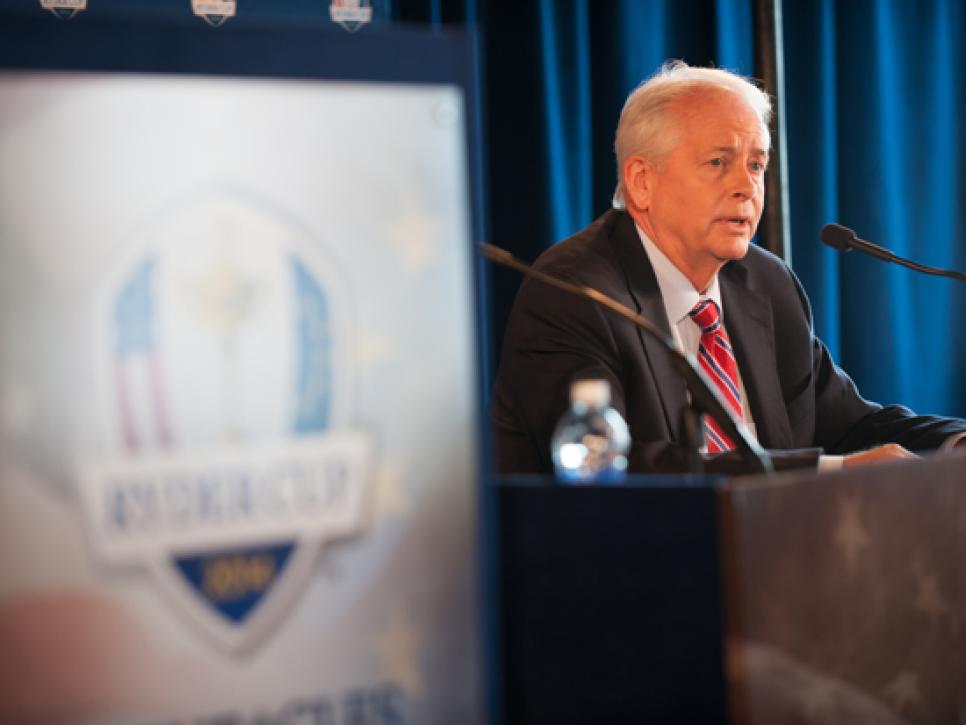News
Bishop Not Going Down Without A Fight

Bishop, at the 2014 U.S. Ryder Cup captains news conference, has been far more vocal than his predecessors.
The open comment period on the USGA and R&A's proposed anchoring ban may have officially closed at the end of March, but a month later the PGA of America's new president is still not going quietly.
Ted Bishop, the man -- or maverick -- who orchestrated Tom Watson as the 2014 U.S. Ryder Cup captain and continues to push back against the anti-anchoring campaign by golf's ruling bodies is now questioning the Royal & Ancient's non-inclusiveness in its leadership role.
After being told by R&A chief executive Peter Dawson that it was not the PGA of America's responsibility to grow the game in America, Bishop, in both an interview and email exchange with Golf World, responded by questioning the R&A's male-only membership.
"I find that to be very curious and perplexing given the fact that the R&A has not been inclusive as evidenced by their unwillingness to accept women as members to the R&A," Bishop said. "This is a much different approach than we have taken in America."
And Bishop is taking a much different approach than past PGA presidents, being publicly candid -- and even outright critical -- of a fellow association leader. Yes, it has come to that in the anchoring crossfire.
Is this latest salvo the work of a shoot-from-the-hip rebel or the bold directness of a change agent? Maybe a little of both. Bishop says his stance against the anchoring ban is not a "personal mission," but comes with being the voice of his 27,000 members, after hearing from a portion of them in a straw poll in March at the PGA Conference of Leaders, where no one raised a hand to support the proposed ban. He admits "some have thought it inappropriate because few in my position have ever done that."
Bishop's R&A comments follow a testy meeting between Bishop and Dawson at the Masters that was first reported in Golf World (Behind Closed Doors, April 22
). When Bishop made the point that the PGA of America was standing up for the "best interests of the amateur golfer," Dawson bristled and, according to Bishop, pointed a finger at him and said, "That's not your role."
Bishop tried to be diplomatic by saying to Dawson, "I hope you don't take this personally." According to Bishop, Dawson said he did take it personally, adding he felt like Bishop "and others in the U.S. grandstanded." And that by the PGA of America taking a position opposed to the rule-making bodies "set golf back." As reported in Golf World, Dawson told Bishop "irreparable damage had been done."
Bishop, general manager and director of golf at Legends GC in Franklin, Ind., said he kept his cool and told Dawson "frankly I don't see it that way." That night, at a reception at the club hosted by Augusta National chairman Billy Payne, Dawson engaged Bishop in an exchange that was "more civil" than the one that morning in a room that included PGA Tour commissioner Finchem, PGA of America CEO Peter Bevacqua, USGA executive director Mike Davis and president Glen Nager.
"The PGA of America has gotten the impression from the R&A that we should have just accepted the proposed rule change and not issued any comments," Bishop said in his email. "Then why have a comment period at all? If you remember, Dawson stated on Nov. 28 that he doubted if any new evidence would surface during the comment period that would result in the ban on anchoring being dropped. That hardly set the stage for an 'open' comment period.'"
Bishop is proposing a compromise to the USGA that would make the ban a condition of competition. He says Davis and Nager have "openly welcomed" his comments and respected his position as leader of the largest working sports organization in the world. As it relates to the R&A, he is pitching a game of hardball that transcends the ruling bodies.
"In the end, I pass off the differences between the PGA of America and the R&A to be a result as the difference between our two cultures," Bishop said in his email. "Europeans have a tendency to accept the things that are imposed by their respective governments, while Americans will debate, argue and vote on issues. I think that is the fundamental premise that America was founded on."
As for the fundamental premise that the rules were made in St. Andrews, Scotland, and Far Hills, N.J., well, that is left for interpretation. If Ted Bishop is pushing for his organization to have more of a voice with the rules-makers, he has succeeded. The PGA of America's position on anchoring is certainly being heard.